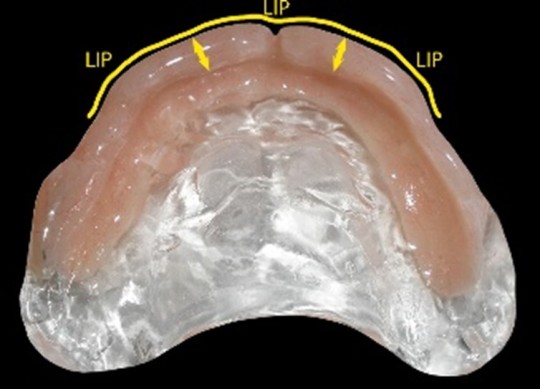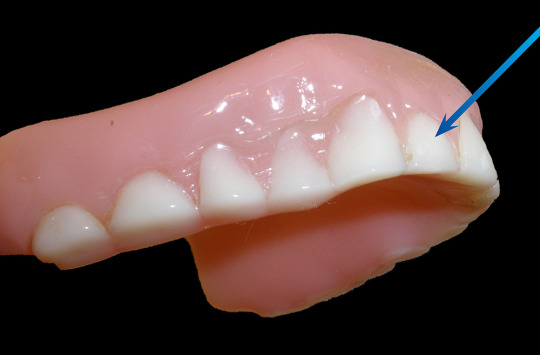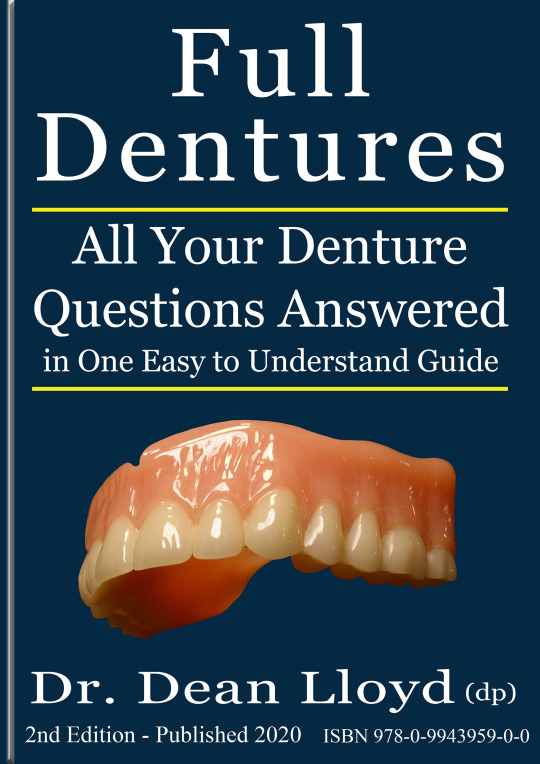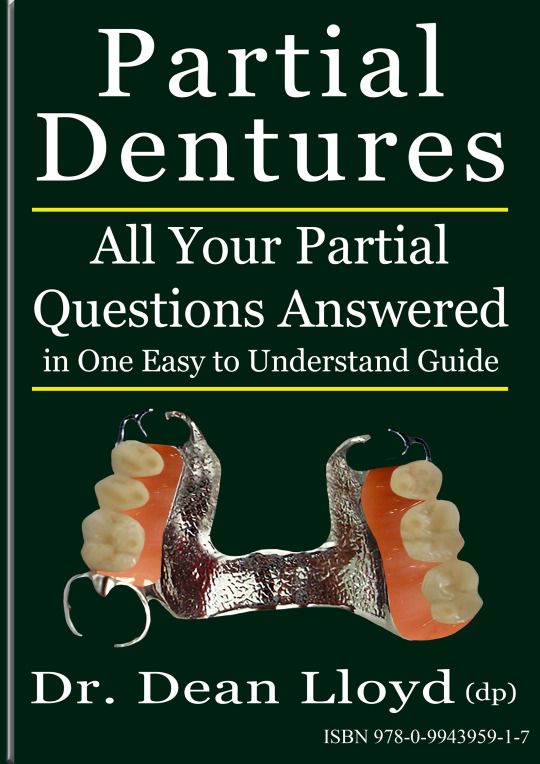Text
𝐓𝐨𝐝𝐚𝐲'𝐬 𝐐𝐮𝐞𝐬𝐭𝐢𝐨𝐧 & 𝐀𝐧𝐬𝐰𝐞𝐫
Question: What are the most common problems associated with the transition to wearing dentures? Answer: The biggest problem you will face is your resistance to returning to your dental practitioner for adjustments when your dentures hurt. Practitioners use words like, “persevere,” or, “give them some time to settle in”. My experience has shown that the longer a patient perseveres, the longer they will suffer! When a denture base impinges onto the soft tissue of the mouth many people think that this impingement will miraculously disappear by itself. Over time, you will find that this plastic will not disintegrate just because you want it to. From here on, many other problems patients face could have been avoided if they simply had the correct information before their dentures went to final manufacture. Problems such as, “my dentist gave me… too dark, too light, too small, too large, incorrectly positioned, ugly looking teeth,” etc. Patients will also talk about problems such as sunken or flaccid looking cheeks and mouth, horsey looking teeth, and on and on the list goes. As I said, these are all avoidable issues you can do without over the next 8 to 10 years, that is, if you have not been given cheap teeth that may last two or less years. If you do not ask for what you want, you must accept what you have been given. Website: https://www.denture-information.com/ Facebook: https://www.facebook.com/DentureInformation
0 notes
Text
𝐓𝐨𝐝𝐚𝐲'𝐬 𝐐𝐮𝐞𝐬𝐭𝐢𝐨𝐧 & 𝐀𝐧𝐬𝐰𝐞𝐫

Question: How can I increase suction with my upper denture?
Answer: Many people think that an upper dentures suction is created by the pallet. An upper denture can be seen like a piston in a sleeve, where the piston is the upper denture flange and the sleeve the patient’s cheeks, and upper lip.
If the piston is too thick (i.e.) the upper dentures outer flange, the piston will simply pop out when a slippery solution is applied (i.e.) the patient’s saliva. Conversely, if the piston is too small for the sleeve, the piston will simply drop down.
A comfortable denture flange thickness can be detected by a nice natural looking facial contour. This means that the patient’s face is neither bloated looking or sunken.
Website: https://www.denture-information.com Facebook: https://www.facebook.com/DentureInformation
0 notes
Text
𝐓𝐨𝐝𝐚𝐲'𝐬 𝐐𝐮𝐞𝐬𝐭𝐢𝐨𝐧 & 𝐀𝐧𝐬𝐰𝐞𝐫 🤔
Question: How long should a pair of dentures last? Answer: Anywhere between 2 years and 12 years. This question rests at the very heart of why I wrote my two books. It cut me very deeply (over 35 years) to see just how often patients were being sold less than what they deserved. Please read my comment from “my boss’ by clicking the link below. (7 paragraphs down the text box) Patients have many, many more choices than what they are offered. There are different qualities of tooth materials, gum materials, and characterization features that, when requested, can make, or break your dentures longevity, natural looks, comfort, and functionality. If you don’t take control, and request these materials, features and properly check your facial profile before your dentures go to final manufacture, you must just accept what you are given. All dentures look great the day they walk out of the clinic. But what are they going to look like 18 – 24 months later, after being brushed with toothpaste? Like this? This denture was made from cheap materials. It was two years old when it came into my clinic. Website: https://www.denture-information.com Facebook: https://www.facebook.com/DentureInformation

0 notes
Text
𝐓𝐨𝐝𝐚𝐲'𝐬 𝐐𝐮𝐞𝐬𝐭𝐢𝐨𝐧 & 𝐀𝐧𝐬𝐰𝐞𝐫 🤔
Question: Which is better for dentures, getting temporary then permanent or getting permanent ones right away? Answer: Temporary and then permanent is better if you can afford it. The reason is that a temporary denture is made from a model when you still had your natural teeth in. So, it is not that accurate. As well, your gums are (let’s say, in the way or too big) for the technician to make a nice natural looking denture. After some months (6-8) your gums will have shrunk sufficiently to give the technician space to fit nice natural looking teeth to the denture. So, in this case, unlike the previous answer, it may be an idea to just go for the cheaper teeth, then, put a better-quality tooth onto your permanent denture. Website: https://www.denture-information.com/ Facebook: https://www.facebook.com/DentureInformation
0 notes
Text
𝐓𝐨𝐝𝐚𝐲'𝐬 𝐐𝐮𝐞𝐬𝐭𝐢𝐨𝐧 & 𝐀𝐧𝐬𝐰𝐞𝐫
Question: How do I take care of dentures with soft lining?
Answer: Great Question. Firstly, never use bleach on a soft lining. You will destroy the lining within 3 months. Secondly, you can follow the instructions given to you by your practitioner, however, depending on the quality of the teeth and pink gum acrylic you chose when your dentures were manufactured, would depend on how long your dentures remain natural looking. Your daily denture care regime can either cost you money for new dentures every 2-4 years or save you money. Denture care explanations are too long for this comment, but you can find them in my Full Dentures book. In the meantime, here is an image of a denture which is just over 4 years old. If you don’t ask for the right materials on your dentures, then take good care of them, you may end up like this unfortunate patient.
1 note
·
View note
Text
Today’s Question & Answer
Question: How do you keep food from getting under your dentures?
Answer: Quite simple. Make sure you get a denture that is correctly designed. Ask yourself these questions. “Which denture is it, and where is the food getting in? Is it my lower or upper? Is the food getting in from the back, along the sides, or in front of the denture?” Answering these questions will start the process of determining what needs to be done. In my Full Dentures book, I have five easy tests you can do at home to determine what is going on. For example, your lower denture may be lifting up when you chew. So now the question is, “why?”
Well, the answer may be (as I explain in my book) that the inner flanges (next to your tongue) are too long. Your teeth may be misaligned, or another easy test is to look at your vertical dimension. Now that may sound complicated - but it’s not. This test is done by you counting to 10. Simple.
So, how do you stop food getting under my denture? Make sure that your next set of dentures are designed according to your wants and needs. One example would be to make sure that your facial contour is correct when you do the wax try-in (appointment 3) before your dentures go to final manufacture.
Here you would ask yourself, “is my face sunken, are my cheeks bloated, or do I look natural?” A sunken face would show the flanges of the denture are too thin, and therefore the denture may be lose, allowing food up the sides!
0 notes
Photo

https://denture-information.com/denture-information-book-offer.html
0 notes
Text
Denture-Information.com
Dentures and partial dentures are expensive. With the influx of questions, I have noted that many people have the same issues as I was presented with, day in and day out, for 35 years. During that time, 𝐈 𝐡𝐞𝐥𝐩𝐞𝐝 𝐨𝐯𝐞𝐫 𝟑𝟕’𝟎𝟎𝟎 𝐝𝐞𝐧𝐭𝐮𝐫𝐞 𝐰𝐞𝐚𝐫𝐢𝐧𝐠 𝐩𝐚𝐭𝐢𝐞𝐧𝐭𝐬 𝐣𝐮𝐬𝐭 𝐥𝐢𝐤𝐞 𝐲𝐨𝐮! Most people go to their local dental practitioner believing that he or she will solve all their problems. As you can see by the vast number of blog questions arriving each day, this is not the case. If you do not take control of what you are purchasing, then you will simply get what you get. You may think that making a choice about your dentures is a difficult thing to do, and you would rather leave the choices up to your practitioner. That, as others have found out, is a mistake. These two books are the only denture books written for you. They are written in a language anyone can understand, without any technical jargon. Together they contain 263 photographs and easy to understand sketches, along with easy explanations.Browse through the reasons for why you want new dentures, what colours, sizes, shapes, and qualities of tooth materials you can choose from. What are your 19 choices you have when it comes to natural looks, feel, comfort and speech. What are my choices of reline? How do I know if I need a reline, or am I being ‘advised’ to go for new dentures? Hmmm. These books are jammed full of 35 years’ experience and knowledge in relation to questions and answers. Bottom line. I can offer these two books to you now at 𝟕𝟓% 𝐝𝐢𝐬𝐜𝐨𝐮𝐧𝐭 𝐟𝐨𝐫 𝐂𝐡𝐫𝐢𝐬𝐭𝐦𝐚𝐬 𝟐𝟎𝟐𝟎. I know you all have unanswered questions. You may also have friends or relatives who have unanswered questions about their dentures. 𝐍𝐨𝐰 𝐢𝐬 𝐲𝐨𝐮𝐫 𝐨𝐩𝐩𝐨𝐫𝐭𝐮𝐧𝐢𝐭𝐲 𝐭𝐨 𝐠𝐞𝐭 𝐭𝐡𝐞 𝐚𝐧𝐬𝐰𝐞𝐫𝐬. 𝐓𝐡𝐢𝐬 𝐢𝐬 𝐚 𝐋𝐢𝐦𝐢𝐭𝐞𝐝 𝐓𝐢𝐦𝐞 𝐎𝐟𝐟𝐞𝐫. https://www.denture-information.com
0 notes
Text
Today’s Question & Answer
Question: How long will new dentures hurt?
Answer: New dentures may hurt for their entire life if you do nothing to correct the situation. There are many reasons for a denture to hurt. It may be too tight or too loose. So, in the case of a denture that’s too tight, the plastic will impinge on your soft tissue and will result in an agonising canker sore or mouth ulcer. The plastic must be reduced in that area, or you continue to suffer. Never believe that your gums will “get used to the tightness or high spot”. They won’t! I have a few stories of patients that were told to “persevere”, and all they got was bleeding gums. A too loose denture will move, irritate and “rasp away” at your gums until the pain becomes too much to tolerate. Please don’t wait for this to happen. In both cases above, your dental practitioner has ways to help you. With proper treatment, dentures can make you look and feel great again. I cannot teach you the whole profession, but if you are armed with some information, and have an idea of your choices, your denture wearing experience does not have to be a nightmare. One more note on this. If correctly done, dentures can be designed to make you look five-to-eight years younger, look like natural teeth, and be comfortable. In my book ‘Full Dentures’, I explain all the different characterisation features you can ask for, to make your denture wearing experience better for you, and your loved ones. People who can’t smile at the camera or they lift their hand to their mouth when they laugh, usually have denture related issues. In all truth, it doesn’t have to be like that.
0 notes
Photo


Denture-Information.com
Full Dentures
Partial Dentures
0 notes
Text
To All Current and Future Denture Wearers!
My name is Dr Dean Lloyd, and I am proud to announce that with 35 years of knowledge, experience and understanding, I have written two books chock full of information, pictures, tips, tricks and hints that answer your many denture questions.
These two books ‘Full Dentures’ and ‘Partial Dentures’ are written specifically to answer the questions that the denture wearer has, and are not medical books for the practitioner.
Too often patients are searching for easy to understand answers, but are either provided the wrong information, or are confused by the answers given. In my two books, I have provided the right answers in an easy to understand way.
If you, or someone you know has denture questions, then head to Denture-Information.com for all your answers.
#dentures#denturecare#partialdentures#denturehealth#health#loosedentures#loosedenture#dentureinformation
1 note
·
View note